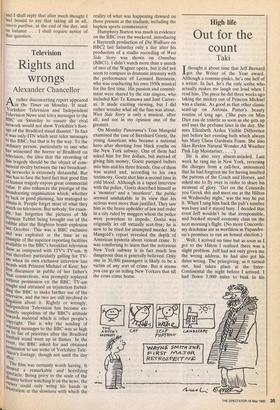Television
Rights and wrongs
Alexander Chancellor
A rather disconcerting report appeared in the Times on Monday. It read: 'Yorkshire Television and Independent Television News sent telex messages to the }IBC on Saturday to ensure the rival network would not show Yorkshire's foot- age of the Bradford stand disaster.' In fact It was only ITN which sent telex messages to the BBC, but that is by the way. To the ordinary person, particularly to one who has witnessed the horror at Bradford on television, the idea that the recording of this tragedy should be the object of com- mercial rivalry between the two broadcast- Ing networks is extremely distasteful. But °Ile has to face the hard fact that good film of human tragedy enjoys great commercial value. It also enhances the prestige of the broadcasting organisation which, whether by luck or good planning, has managed to obtain it. People forget most of what they Watch on television. But nobody, for exam- Ple, has forgotten the pictures of Mr NOrman Tebbit being brought out of the rubble after the Brighton bomb explosion last October. This was a BBC exclusive and was exploited at the time as an example of the superior reporting facilities available to the BBC's breakfast television show as compared with ITV's TV-am. It Was therefore particularly galling for TV- ant when its own exclusive interview last month with Princess Michael of Kent, her first discussion in public of her father's Nazi connections, was promptly replayed without permission on the BBC. TV-am sought and obtained an injunction forbid- (I. log the BBC to make further use of the 1,Oterview, and the two are still involved in litigation about it. Rightly or wrongly, l ,adependent Television has become ex- trmely suspicious of the BBC's attitude towards material which is other people's e°Pyright. This is why the sending of Warning messages to the BBC was so high ?n Its list of priorities after the Bradford football stand went up in flames. In the event, the BBC asked for and obtained Permission !Mission to use some of Yorkshire Tele- vision's footage, though not until the day after.
The film was certainly worth having. It showed a remarkable and horrifying ,Peetacle. Being privy to the scale of the disaster before watching it on the news, the iiewer could only wring his hands in irustration at the slowness with which the
reality of what was happening dawned on those present at the stadium, including the hapless sports commentator.
Humphrey Burton was much in evidence on the BBC over the weekend, introducing
a Bayreuth production of Die Walkure on BBC2 last Saturday only a day after his production of a studio recording of West Side Story was shown on Omnibus
(BBC1). I didn't watch more than a snatch of two of the Wagner opera, but it did not
seem to compare in dramatic intensity with the performance of Leonard Bernstein, who was conducting his own 1950s musical for the first time. His passion and commit- ment were shared by the star singers, who included Kiri Te Kanawa and Jose Carrer- as. It made exciting viewing, but I did rather wonder what all the fuss was about. West Side Story is only a musical, after all, and not in my opinion one of the greatest.
On Monday Panorama's Tom Mangold examined the case of Bernhard Goetz, the young American who became a national hero after shooting four black youths on the New York subway. One of them had asked him for five dollars, but instead of giving him money, Goetz pumped bullets into him and his three friends. One of them was seated and, according to his own testimony, Goetz shot him a second time in cold blood. Although in a taped interview with the police, Goetz described himself as a 'monster' and a 'murderer', the public seemed unshakable in its view that his actions were more than justified. They saw him as the brave upholder of law and order in a city ruled by muggers whom the police were powerless to impede. Goetz was originally let off virtually scot-free; he is now to be tried for attempted murder. Mr Mangold's report revealed the depth of American hysteria about violent crime. It was comforting to learn that the notorious New York subway is in fact much less dangerous than is generally believed. Only one in 30,000 passengers is likely to be a victim of any sort of crime. But it seems you can go on telling New Yorkers that till the cows come home.














































 Previous page
Previous page